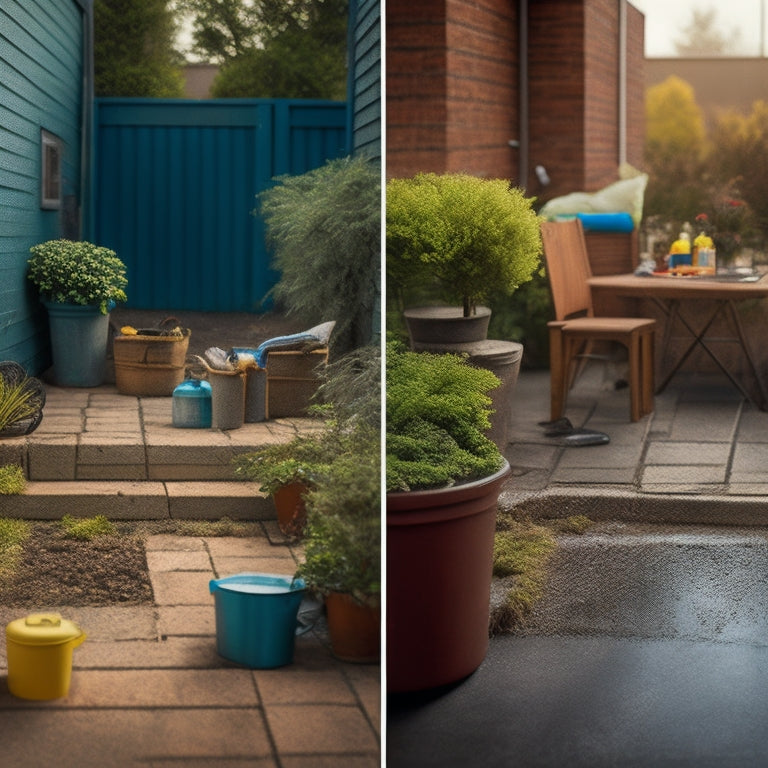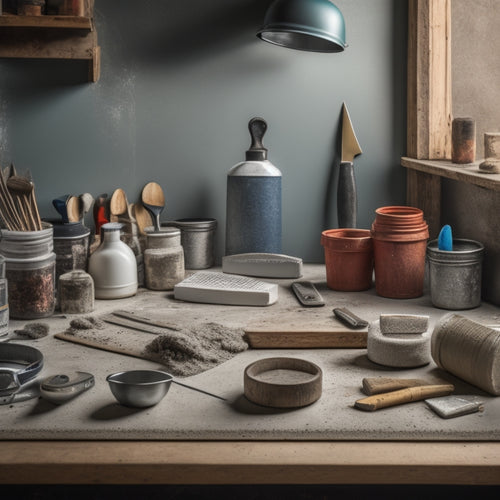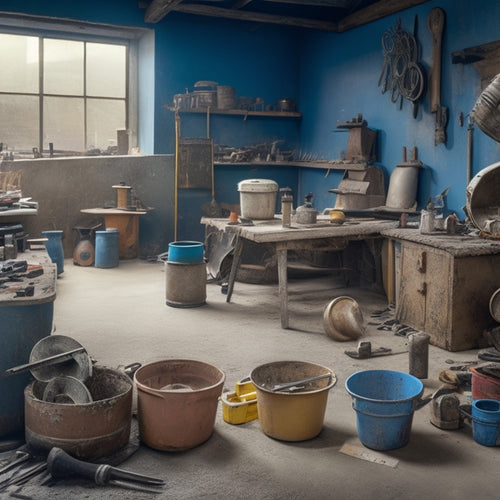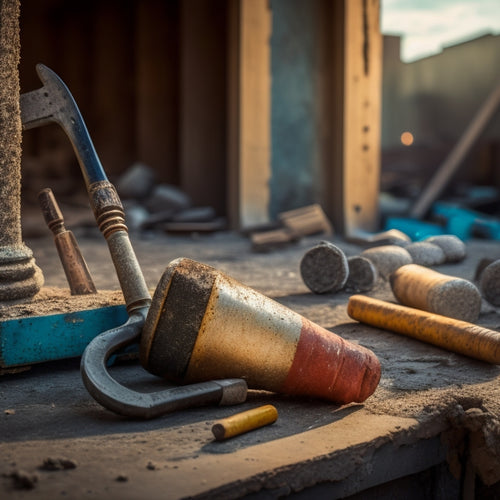
Top Tools for Cleaning Concrete Blocks at Home
Share
You'll need a combination of tools and techniques to effectively clean concrete blocks at home. Start with power washing to loosen dirt and grime, using a wide fan tip nozzle to prevent etching. Next, use stiff-bristled scrub brushes, paired with eco-friendly cleaners, to tackle tough stains. For larger areas, consider an electric power brush or a soft-headed broom. The right pressure washer nozzle type and chemical cleaning solutions will also make a big difference. Don't forget safety equipment like gloves, goggles, and a dust mask. Now that you have the basics, you're ready to get started - and discover the finer details that'll make all the difference in your cleaning project.
Key Takeaways
• Use stiff-bristled scrub brushes with eco-friendly cleaners for effective and gentle cleaning of concrete blocks.
• Electric power brushes with soft bristles are ideal for large areas, providing efficient and damage-free cleaning.
• Select the right pressure washer nozzle type, considering dirt level and surface type, to ensure efficient cleaning.
• Brooms with soft heads, made from nylon or polypropylene, are suitable for sweeping and cleaning concrete blocks.
• Always wear safety equipment, including chemical gloves, safety goggles, and dust masks, when cleaning concrete blocks at home.
Power Washing Concrete Blocks
Start by power washing the concrete blocks to blast away any loose dirt, grime, or debris that may be obscuring the surface.
You'll be amazed at how much gunk is hiding in those pores! This initial step is essential in concrete surface preparation, as it exposes the surface for further cleaning and guarantees a better bond with any subsequent coatings or sealers.
When using power washing techniques, make sure to keep the nozzle at least 12 inches away from the surface to avoid damaging the blocks.
Also, use a wide fan tip to distribute the pressure evenly and prevent etching. Work in sections, cleaning one area at a time, and use a gentle sweeping motion to cover the entire surface.
Don't forget to wear protective gear, including gloves, safety glasses, and a mask to avoid getting soaked or inhaling debris.
Effective Chemical Cleaning Solutions
What chemical cleaning solutions will you use to tackle the tough stains and grime that power washing didn't remove? You've got the power washer out of the way, now it's time to bring in the big guns. When it comes to effective chemical cleaning solutions, you've got options. But, let's get real, not all chemicals are created equal.
Here are three key considerations when choosing a chemical cleaning solution:
-
Eco-friendly cleaners: You want to clean your concrete blocks, not harm the environment. Opt for eco-friendly cleaners that are biodegradable and non-toxic.
-
Surface preparation: The right chemical solution can help prepare the surface for further cleaning or sealing. Look for solutions that can help open up the pores of the concrete, allowing for a deeper clean.
-
pH level: Make sure the chemical solution you choose has a pH level close to that of water (around 7). This will help prevent damage to the concrete or discoloration.
Scrub Brushes for Tough Stains
When you're faced with stubborn stains on your concrete blocks, you'll need the right scrub brush to get the job done.
You'll want to choose a brush that can tackle tough stains head-on, and that means selecting the right bristle type and cleaning technique for the task.
Tough Stain Removal Methods
You'll need a scrub brush with stiff bristles to tackle tough stains, as they can effectively dislodge and remove stubborn dirt and grime from the concrete blocks' surface. When it comes to tough stain removal, you'll want to pair that brush with some natural stain solutions or eco-friendly cleaners that can help break down the dirt without damaging the concrete.
Here are three scenarios where a scrub brush with stiff bristles will be your best friend:
-
Grease and oil stains: These can be notoriously difficult to remove, but a stiff-bristled brush can help dislodge and lift the stain out of the concrete.
-
Mold and mildew: A scrub brush with stiff bristles can help scrub away mold and mildew, leaving your concrete blocks looking fresh and clean.
-
Heavy dirt and grime buildup: For those tough, caked-on dirt and grime stains, a stiff-bristled brush will help dislodge and remove the dirt, leaving your concrete blocks looking like new.
Remember to always test a small area first to verify the brush and cleaner you're using won't damage the concrete. With the right tools and techniques, you'll be able to tackle even the toughest stains and get your concrete blocks looking like new!
Brush Bristle Types Matter
Three types of bristle materials - nylon, polypropylene, and natural fibers - are commonly used in scrub brushes designed for tackling tough stains on concrete blocks.
When it comes to choosing the right brush, you'll want to evaluate the specific stain you're dealing with. Nylon bristles are great for general-purpose cleaning and are known for their flexibility, making them perfect for getting into tight spaces. Polypropylene bristles, on the other hand, are stiffer and more aggressive, making them ideal for tough, stubborn stains. Natural fibers, like coconut or palmyra, offer a gentler approach and are often used for lighter cleaning jobs.
When it comes to brush durability, nylon and polypropylene bristles tend to outlast natural fibers. This is because they're more resistant to wear and tear, and can withstand harsh cleaning chemicals.
Bristle stiffness is also important, as it determines how effectively the brush can scrub away stains. Look for brushes with stiff bristles for tough stains, and softer bristles for lighter cleaning jobs.
Aggressive Cleaning Techniques
For tackling tough, set-in stains on your concrete blocks, it's time to bring out the big guns: aggressive cleaning techniques that rely on scrub brushes specifically designed to take on stubborn stains.
These brushes aren't for the faint of heart, but for those willing to get down and dirty to get the job done. When paired with the right eco-friendly cleaners, these scrub brushes can be a powerful tool in your cleaning arsenal.
Here are three key things to keep in mind when using aggressive cleaning techniques:
-
Don't overdo it: While scrub brushes can be effective, they can also damage your concrete blocks if used too aggressively. Be gentle, but firm.
-
Choose the right brush: Stiff-bristled brushes are best for heavy-duty cleaning, while softer-bristled brushes are better for more delicate surfaces.
-
Combine with pressure washing techniques: For extra tough stains, try combining your scrub brush with pressure washing techniques for maximum impact.
Pressure Washer Nozzle Types
When selecting a pressure washer nozzle, choosing the right type is essential, as it directly affects the cleaning efficiency and effectiveness on your concrete blocks. You don't want to be stuck with a nozzle that's too weak or too strong for the job.
The nozzle pressure, measured in pounds per square inch (PSI), should match the level of dirt and grime on your concrete blocks. For heavy-duty cleaning, you'll need a nozzle with high PSI, while lighter cleaning tasks require lower pressure.
The nozzle material is also vital. Stainless steel and brass nozzles are durable and resistant to corrosion, making them ideal for heavy use. However, they can be pricey. Aluminum nozzles are a more affordable option but may not last as long.
Consider the trade-off between cost and durability when making your decision. Additionally, some nozzles come with adjustable tips, allowing you to switch between wide fan tips for large areas and narrow tips for tight spaces.
Soft Bristle Brush Alternatives
When you can't find a soft-bristle brush, you'll need to explore alternative options to effectively clean your concrete blocks.
You'll want to take into account using a brush with nylon bristles, an electric power brush, or a broom with a soft head - each of which can provide the gentle scrubbing action you need.
Brush With Nylon Bristles
Scrubbing concrete blocks with a nylon-bristle brush effectively removes dirt and grime without scratching the surface. This is because nylon bristles are gentle yet sturdy, making them perfect for tackling tough stains without causing damage.
One of the major nylon bristle benefits is that they're easy to clean and maintain, ensuring your brush stays in top condition for its next use.
To keep your nylon-bristle brush in top shape, follow these simple brush maintenance tips:
-
Rinse thoroughly: After each use, rinse your brush with warm water to remove any dirt or debris.
-
Store dry: Allow your brush to air dry, or gently pat it dry with a towel to prevent water spots.
-
Occasionally soak: Every few uses, soak your brush in warm soapy water for 10-15 minutes to deep clean the bristles.
Electric Power Brush Option
You can switch to an electric power brush with soft bristles for a more efficient and effortless cleaning experience, especially when tackling large areas of concrete blocks. This tool is a game-changer, saving you time and energy while still providing a thorough clean.
One of the significant electric brush benefits is its ability to cover more ground quickly, making it ideal for large concrete block surfaces. Additionally, the soft bristles guarantee a gentle yet effective cleaning process that won't damage the blocks.
To get the most out of your electric power brush, follow some simple maintenance tips. Regularly clean the brush head to prevent debris buildup, and store it in a dry place to prevent rust or corrosion.
Also, check the brush's power cord for any signs of wear and tear, replacing it if necessary. By following these tips, you'll enjoy a prolonged lifespan for your electric power brush and continued excellent performance.
With this tool in your arsenal, you'll be tackling those concrete blocks like a pro in no time!
Broom With Soft Head
Using a broom with a soft head is another effective alternative to scrub brushes, allowing you to sweep away dirt and debris without scratching your concrete blocks. You'll appreciate the soft head benefits, as they're gentler on your surfaces while still providing a thorough cleaning.
When selecting the ideal broom for the job, consider the following:
-
Bristle material: Look for soft-bristled brooms made from materials like nylon or polypropylene, which are gentle on concrete but still effective at picking up dirt and debris.
-
Broom head size: A larger broom head will cover more surface area, but may be more difficult to maneuver in tight spaces. Choose a size that suits your specific cleaning needs.
-
Handle material and length: A sturdy, comfortable handle will make it easier to clean for extended periods. Opt for a handle made from durable materials like fiberglass or wood, and consider a length that suits your height and cleaning style.
Safety Equipment for Cleaning
Before tackling concrete block cleaning, equip yourself with essential safety gear, including gloves, safety glasses, and a dust mask, to prevent injuries and protect your health. You don't want to end up with concrete dust in your eyes or harsh chemicals on your skin!
Here's a quick rundown of must-haves:
| Safety Gear | Why You Need It |
|---|---|
| Gloves (chemical) | Protect your hands from harsh chemicals and abrasive concrete |
| Safety Goggles | Keep your peepers safe from flying debris and chemical splashes |
| Dust Mask | Breathe easy and avoid inhaling concrete dust and other particles |
Frequently Asked Questions
Can I Use Bleach to Clean Concrete Blocks?
Can you use bleach to clean concrete blocks? Well, you can, but you shouldn't.
Bleach can damage the concrete's surface and weaken its structure. Instead, opt for bleach alternatives like oxygen-based cleaners or mild detergents.
Regular concrete block maintenance involves gentle cleaning to prevent damage. Think of it like washing your car - you wouldn't use harsh chemicals, right?
How Often Should I Clean Concrete Blocks?
Did you know that 80% of dirt and grime on concrete blocks is preventable with regular maintenance?
You're on the right track by wondering how often to clean them! As a general rule, clean your concrete blocks every 2-3 months to prevent dirt buildup.
For high-traffic areas, bump that up to monthly.
Can I Paint Over Dirty Concrete Blocks?
'Can you paint over dirty concrete blocks? Not if you want a decent finish! You'll end up with a peeling, flaking mess.
Instead, prep those blocks like a pro. Clean them thoroughly, then apply a concrete primer to create a solid base.
Now, you're ready for painting techniques like staining or sealing. Don't skip concrete preparation, or you'll be repainting sooner rather than later.
Trust us, it's worth the extra effort – your walls will thank you!'
Do I Need to Seal Concrete Blocks After Cleaning?
The million-dollar question: do you need to seal concrete blocks after cleaning? Hold your breath, because the answer is a resounding 'maybe.'
Sealing benefits are undeniable - it protects from stains, enhances appearance, and makes future cleaning a breeze.
But, it's not a one-size-fits-all solution. You'll need to evaluate sealing techniques, block type, and intended use.
Can I Use a Regular Hose to Clean Concrete Blocks?
Can you use a regular hose to clean concrete blocks? Well, you can, but you won't get the best results. A regular hose just doesn't provide enough pressure to blast away dirt and grime.
Instead, consider pressure washing - it's like a superhero for your concrete blocks! Just be sure to use eco-friendly solutions to avoid harming the environment (or your neighbors, for that matter).
Trust us, your concrete blocks will thank you!
Conclusion
As you've now mastered the art of cleaning concrete blocks like a medieval artisan, it's time to put your newfound skills to the test.
Remember to don your safety gear, choose the right nozzle, and mix your cleaning solutions with precision.
With power washing, chemical cleaning, and scrubbing, you'll be able to vanquish even the toughest stains.
Your concrete blocks will shine like new, and your neighbors will be green with envy.
Related Posts
-

Essential Tools for Concrete Wall Covering Projects
When tackling a concrete wall covering project, you'll need a range of essential tools and equipment. For cleaning an...
-

Best Tools for Concrete Restoration and Repair
When tackling concrete restoration and repair projects, you need a range of reliable tools to achieve professional-gr...
-

5 Tips for Splitting Concrete With Second-Hand Tools
When splitting concrete with second-hand tools, you'll need to be strategic to avoid wasting time, money, and putting...


